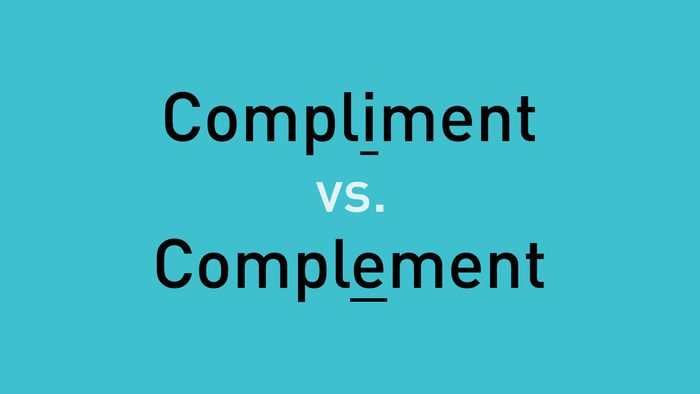Compliment vs. Complement: What’s the Difference?
Updated: Nov. 03, 2022

Pay someone a compliment—or is it complement? Here's how to tell the difference and never make that mistake again.
A thoughtful compliment can make your day…unless it’s backhanded, of course. A complement (spelled with an “e” instead of an “i”) can also be a good thing, but in a much different way. What’s the difference? Compliment and complement are homophones, meaning they’re pronounced the same but have different spellings and different meanings. The compliment vs. complement word brawl gets complicated because the words are similar and commonly used, and often, people don’t even realize they’re making a mistake. Read on to get the lowdown on the right way to use each word. If you think this is confusing, you’re not alone. Check out these 25 homophones people confuse all the time.
Compliment vs. complement: A shared Latin root
According to Merriam-Webster, “despite the difference in their meanings, both complement and compliment have roots in the Latin word complēre which means ‘to complete.'” The word complement goes back to the 14th century, where its Latin roots connect to meanings like “to fill up” or “to be full.” It shares with complete the sense of completion as an accomplishment or an abundance that leans positive. Compliment, however, gains an additional nuance related to complete—to be courteous. The first known use of compliment was in 1598.
When should you use compliment?
Flattery will get you everywhere—or nowhere, depending on your skill in paying a compliment. When you compliment someone, you express respect and admiration. Have you ever complimented a chef on a great meal? You can also receive a compliment. That’s a kind remark or an honor. The term complimentary also means gratis, free, or on the house. If you want to pay someone a compliment with the latest slang, tell them they look “snatched,” one of the 30 slang words to love from 2019.
When should you use complement?
Have you ever heard of complementary colors? When something is complementary, it completes or enhances in a positive way. As a noun, a complement makes something better or more perfect, as in “she was a complement to the team.” As a verb, you could say that “the wine choice complemented the meal.” The word complement always adheres to the root word complete. Vocab mix-ups are all too easy.
What’s the main difference between compliment and complement?
You could receive a compliment that your outfit complements your eye color. Compliment vs. complement may seem like a head-scratcher, but it doesn’t have to be. The best way to determine the difference is to think about the root word complete. Complement is always the word to use when you’re talking about completion or completing something in a positive way and making it better. Opt for compliment, however, when you’re admiring. Speaking of which, you might want to take a look at these 15 tips on how to give a sincere compliment.



















